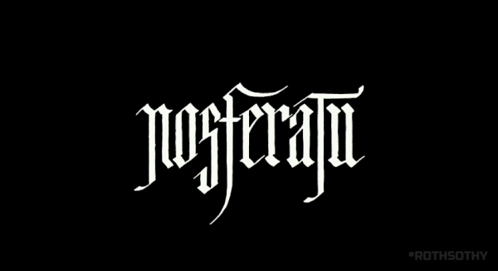YOU WANT IT DARKER

Emerging into the half-light of a new year after being entombed over Christmas with food, drink, and family for a few days, I find myself seeking fresh inspiration to rekindle my subdued flame of existence—hoping for it to shine a little brighter through the final winter months of January and February. Perhaps it’s fitting, then, that I began the year by watching the new Nosferatu on New Year’s Day, hoping to commune with my inner vampire.
Unfortunately, what I encountered was less fresh blood and more coagulated residue. Director Robert Eggers’ work, much like that of many contemporary commercial directors, strikes me as more akin to cosplay directing than the genuinely original or visionary filmmaking of, say, Henri-Georges Clouzot, Stanley Kubrick, Krzysztof Kieślowski, or Wong Kar Wai. It feels as though we are currently trapped in the all-too-mortal age of Thomas Hutters rather than the infinitely more fascinating and supernaturally gifted Nosferatus of cinema’s past—artists whose work remains timeless. I'm genuinely hoping for someone to come along and drive a stake through the anaemic, barely-breathing corpse of modern cinema, ushering in a new era of originality—but I shan't hold my breath.
Sadly, Eggers’ Nosferatu proved to be a distinctly underwhelming retelling of F.W. Murnau’s 1922 silent classic, which famously starred Max Schreck as Count Orlok. While I appreciated some of the visuals, art direction, and attempts at atmosphere in this new version, it ultimately felt too mannered and rushed. I had hoped for a more Wagnerian approach, one that would truly evoke the narrative transition from midnight darkness to sun-burnished dawn in a Tristan-esque fashion, culminating in the grotesque and semi-erotic climax between the Count (Bill Skarsgård) and his victim muse, Ellen Hutter (Lily-Rose Depp). Too often, however, the big moments seemed unearned. It all felt more like Sunday-night Christmas viewing from the BBC than a new benchmark in cinematic horror.
Still, it did spark an intriguing thought (at least for me): how incredible it would have been for there to have been a Wagner opera version of Bram Stoker's Dracula. He would have truly nailed it—pun intended. Murnau, of course, was deeply influenced by Wagner's works and even cited Der Fliegende Holländer (The Flying Dutchman) as a major inspiration for his original Nosferatu. Both figures are immortal, though the Flying Dutchman seeks redemption from his cursed existence through the love of a woman, while Count Orlok simply enjoys possession and consumption of a woman to sustain his existence—his flickering "flame of existence," if you will.